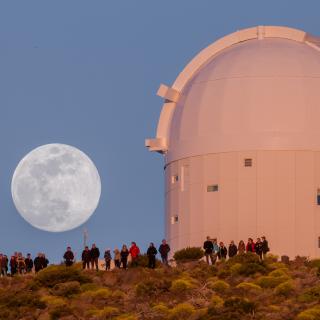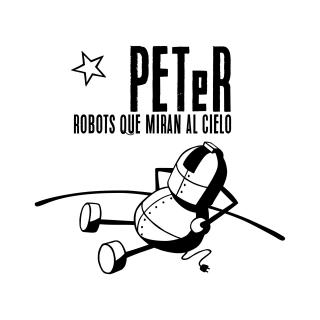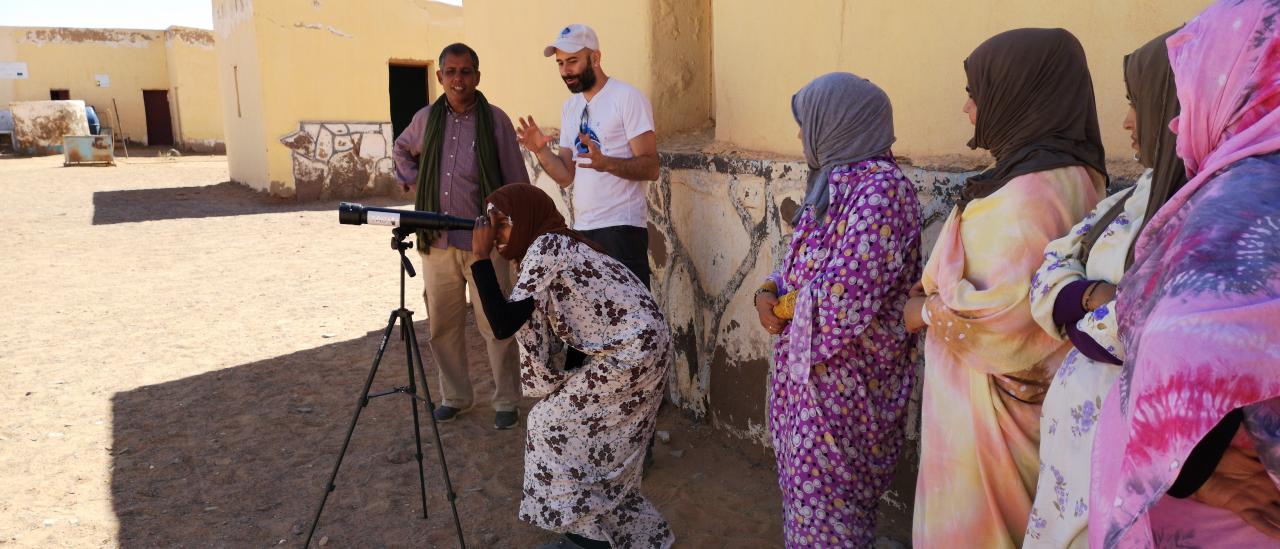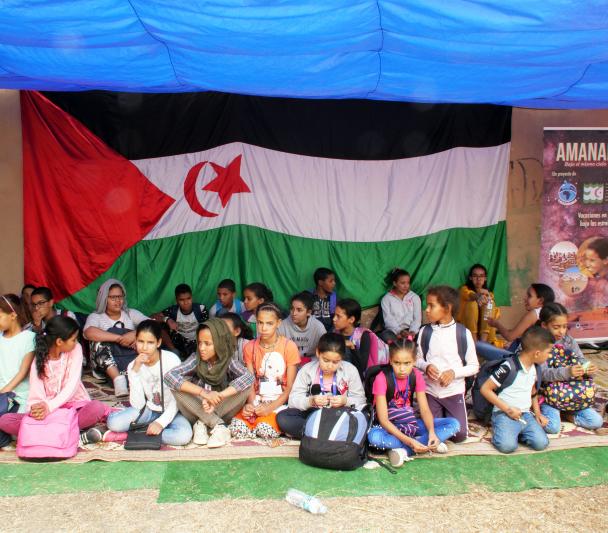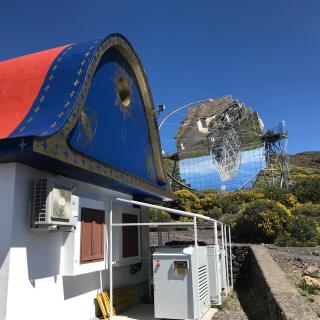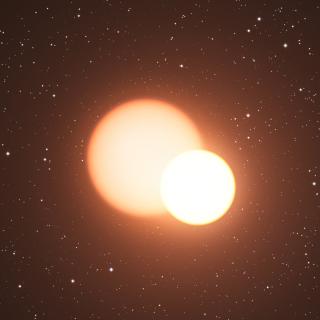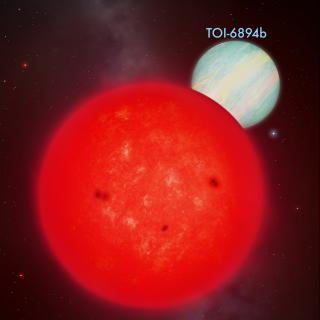An international team of astronomers, science educators, and film-makers, with participation from the Instituto de Astrofísica de Canarias (IAC) made a ten day visit to the Sahrawi refugee camps in Tindouf, Algeria, and organized Astronomy outreach and educational activities, within the framework of the project “Amanar, under the same sky”.
The Amanar project was started with the aim of inspiring Sahrawi students who live in the refugee camps of Tindouf (Algeria) by means of astronomy and knowledge of the Universe, and also to give a feeling of citizenship “under the same sky” which is the motto of the project.
Amanar consists of two parts, which have been carried out between July and October 2019.The first part took place during the summer months, and comprised the organization of workshops and astronomical observations with the Sahrawi boys and girls who visited the Canary Islands within the “Holidays in Peace” programme. For the second part, which took place in October, an international team of astronomers, science educators, and film-makers travelled to the refugee camps in Tindouf (Algeria) to work with the local students and teachers, taking with them educational material to donate to the schools and training centres and carrying out a study in ethnoastronomy, as well as making different audiovisuals.
The team comprised members and collaborators of the GalieoMobile group, (www.galileo-mobile.org), including two outreach astronomers from the IAC, Sandra Benitez Herrera, and Nayra Rodríguez Eugenio, together with Andrea Rodríguez Antón, former PhD student at IAC and an expert in ethnoastronomy. The astrophysicists Jorge Rivero González (International Astronomical Union, and Leiden University), Fabio del Sordo (University of Crete) and Diego Torres (Brazilian Centre for Scientific Research) and the film-makers Felipe Carrelli and Demétrio Rodrigues made up the rest of the team. The delegate of the Polisario Front in the Canaries Hamdi Ahmed Aomar accompnied the group during the journey, organizing the visits and carrying out translations into hassannía (the dialect of the Western Sahara) when necessary.
Astronomy to encourage critical thinking
Among the activities in the program there were visits to four secondary schools where talks were given and practical activities performed about various subjects in astronomy such as the Sun-Earth-Moon system, the constellations, the Solar System, and space missions. In addition, in each school and in one teacher training centre there was a workshop for the teachers to present the “Inquiry-Based Learning” approach and to demonstrate the working of the instruments which had been donated: a telescope with which the Moon, and the brighter planets such as Jupiter and Saturn can be easily observed, and an interferometer with which they can perform practical experiments on certain optical phenomena, such as reflection, refraction, and interference of light.
Another visit was to a training centre in which young women who have finished secondary school and want to continue their education can take a variety of courses, including informatics and the production of audiovisuals, as well as traditional Sahrawi weaving. In this centre there was a talk and a debate about the participation of women in science and technology, and in particular in astronomy, as well as a brief course about the production and editing of images and videos with the women studying the subject.
A total of 550 students and 66 teachers participated in the activities carried out in the five wilayas (an arab term meaning the administrative subdivisions, and in this case meaning camps) of Tindouf. Ten refracting telescopes were given out (donations from the International Astrronomical Union and the Office of Astronomical Outreach), also a reflecting telescope (donated by a worker in Grantecan), five interferometers (donated by the Virgo collaboration), two projectors, hundreds of postcards, astronomical posters, and eclipse glasses (given by the IAC), tens of DVD’s and posters (donated by the CTA collaboration), 80 sets of handbooks of educational activities (donated by GalileoMobile), five globes of the Earth (donated by UNAWE), and also basic school material, such as coloured pencils, ballpoints, felt-tips, scissors, rules, exercise-books, plasticine, coloured paper etc.
Astronomy as a cultural asset
As well as educational activities the project also had two further aimes: collect and record the ancestral astronomical knowledge of the Sahrawi people, transmitted from parents to children as an oral tradition, and to contribute to the spreading of this knowledge to new generations so that it will not be lost.
The team interviewed four male and female experts, who showed well based knowledge about the “Anwas” or lunar mansions, the traditional arab system for identifying stars and measuring time. This system has been used for orientation in the desert and for the prediction of atmospheric conditions. The ethnoastronomy research, led by Andrea Rodríguez Antón, will be published in a specialized journal. In addition the audivisual recordings and interviews will be returned to the Sahrawi community via the head of the Ministry of Culture's Oral History department, so that they can be used for cultural and educational purposes.
Astronomy for the future
The project will now enter a new phase, to carry out the ethnoastronomical study with the material collected, and to edit the films, as well as to strength the collaboration with local stakeholders, and to continue supporting science education in the Sahrawi camps.
"The balance of the project has been very positive, both during the stage of activities in the Canaries and in the refugee camps, where we have also established a solid network of contacts which will allow the work to continue", says Sandra Benitez Herrera, coordinator of the project and a member of GalileoMobile since 2011.
“Beyond the initial impact of the project, we have returned with the feeling of having planted a seed” explains Nayra Rodríguez Eugenio, “and we have also brought back a seed from the desert, the unity and the strength of a people who do not give in to adversity”.
Acknowledgements
The team of “Amanar: under the same sky” wishes to thank the Office of Astronomy for Development, the International Astronomical Union, and the Instituto de Astrofísica de Canarias for funding the project. We also thank the important work of the Sahrawi institutions and collaborators which has been essential to ensure the good results of the project: the Protocole Centre, the Ministry of Education and Training, the Ministry of Cooperation, the Ministry of Culture, the Simón Bolivar, Halil Sidiem Hem and Olof Palme education centres, the secondary schools of Dajla, and especially the drivers Tawalo and Shidajma, and the Sahrawi experts who shared with us their extensive knowledge of the sky. Our thank you as well to all the scientific institutions which have donated educational material and telescopes for distribution in the schools.
Finally, we thank the Canarian Association of Friendship with the Saharawi People (ACAPS) and its president Alberto Negrín, for their unconditional support to the project since the beginning and for their collaboration in the organization of activities in the Canaries and the trip to the Tindouf camps.
Previous press releases:
https://www.iac.es/es/divulgacion/noticias/amanar-bajo-el-mismo-cielo
More information:
